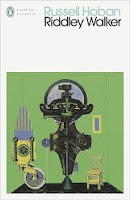It is the dismay of people learning the English language everywhere to discover the fact that they must, in fact, learn two languages: the signed (written) and spoken (verbal). For whatever reason, we have 'to', 'two', and 'too' while writing, but pronounce all the same. There are few other languages for whom spelling bees are as dynamic. Literally embracing this fact to tell of a post-apocalyptic future is Russell Hoban's brilliant 1980 Riddley Walker.
Riddley Walker is set an unknown amount of time in a post-nuclear future of England. Shit hit the fan, and the bombs went off. Enter young Riddley Walker. Son of the group's soothsayer, he faces tragedy early when his father is crushed while excavating a large machine from the mud. But more ominous omens occur, including Riddley being attacked by a pack of dogs. He is forced out of the group and into the wilds. Journeying the ravaged, primitive lands, he runs into all manner of people, trying discover a new place for himself.
It needs to be stated first in this review: Riddley Walker is perhaps the novel which most clearly represents the idea of 'prose'. It is not written in standard English. Instead, it is written in a mix of proper and phonetic English. Add to that the quaint coloquialisms of rural England and it's a thing of beauty.
“Raining agen it wer nex morning. Theres rains and rains. This 1 wer coming down in a way as took the hart and hoap out of you there wer a kynd of brilyants in the grey it wer too hard it wer too else it made you feal like all the tracks in the worl wer out paths nor not a 1 to bring you back. Wel of coarse they are but it dont all ways feal that way. It wer that kynd of morning when peopl wernt jus falling in to what they done naturel they had to work ther selfs in to it. Seamt like a lot of tea got spilt at breakfas nor the talk wernt the userel hummeling and mummeling there wer so.”
Reading Riddley Walker requires effort. While flow state is possible, it's never absolute. Every page the reader must pause to parse a word or two. It is a Bavarian chocolate tort—the mother of all cakes for people who revel in the phonetics of the English language. If reading a couple hundred pages of that type of prose is not to your liking, I recommend the audiobook as, regardless of style, the story itself is a piece of beauty.
In its bones, Riddley Walker fits a classic definition of science fiction: extrapolation on a potential future humanity. In this case, a post-apocalyptic world. But the novel presents itself more as fantasy. Walker's world is our world, but due to the changes that have occurred his perspective is of a world foreign to us. Naturally there are pieces semiotically connected to our world, but Walker doesn't have our knowledge, our understanding. Large machines are typically just hunks of mysterious metal, no idea what their function used to be. New religions and beliefs have formed. And in a glorious coup de tat, Punch & Judy shows have become shamanistic.
Perhaps the most compelling aspect of Riddley Walker is the manner in which it injects magic back into life. Where science has increasingly revealed the secrets behind the colors of the rainbow, in Walker's world a rainbow is still a thing of numinous meaning. On his travels, Riddley perpetually runs into people trying to read substance and purpose into signs and symbols—things 21st century humans look at with significantly less interest given science has has explained much of it into mundaneity, to deep academia. The old magic is back in Riddley Walker, for all its grizzled beauty.
The primary mode of Riddley Walker is bizarre spiritual journey. Adjacent but not similar, it has echoes of David Lindsay's Voyage to Arcturus, including the exoticism of setting and the relative spirituality of Walker's journey. There are likely people who would also put a coming-of-age label on the novel, and I can't wholly disagree. Those elements exist. But I would argue that the metaphysical, exploratory side of Walker's story takes a bit more of the book's wheel than lessons learned and personal discovery. Walker discovers things, but they are presented as more applicable to spirituality than quotidian life. Walker seems to be trying to understand life and humanity more than himself, which allows the novel to spread its wings even wider.
Riddley Walker is a phenomenal read for people not put off by its unique phonetic stylings. Linguists to characterization, setting to substance, Riddley Walker constantly takes the high road. Where a lot of contemporary post-apocalyptic stories end up in 'cheap plot' land, Hoban guides young Riddley on a spiritual journey that ends on a beautiful note, one both cynical and cheerfully practical. Perhaps the following will step a bit too close to hypberbole for some, but I will say it anyway; the novel should be considered a contribution to culture and humanity in a manner that transcends the time Hoban wrote it, our time, or any time in the future. Yes, this is literature.


No comments:
Post a Comment